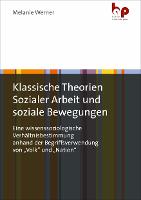Klassische Theorien Sozialer Arbeit und soziale Bewegungen
Eine wissenssoziologische Verhältnisbestimmung anhand der Begriffsverwendung von „Volk“ und „Nation“
Abstract
Social work has repeatedly placed itself in relation to social movements – but has not defined this relationship further. This book empirically explores the relationship of social work to social movements and looks at the period of social work's emergence – the German Empire and the Weimar Republic. The author asks how the concepts of "people" and "nation" are thematized in journals of the labor movements, the youth movement, and the bourgeois women's movement, as well as in classical theoretical approaches to social work, and what conclusions can be drawn from this about the relationship of social work to social movements. Soziale Arbeit hat sich immer wieder zu sozialen Bewegungen ins Verhältnis gesetzt – dieses aber nicht weiter definiert. Dieses Buch geht dem Verhältnis von Sozialer Arbeit zu sozialen Bewegungen empirisch nach und betrachtet den Entstehungszeitraum Sozialer Arbeit – das Deutsche Kaiserreich und die Weimarer Republik. Die Autorin fragt danach, wie in Zeitschriften der Arbeiterbewegungen, der Jugendbewegung und der bürgerlichen Frauenbewegung sowie in klassischen Theorieansätzen Sozialer Arbeit die historischen Grundbegriffe „Volk“ und „Nation“ thematisiert werden und welche Schlüsse sich daraus auf das Verhältnis von Sozialer Arbeit zu sozialen Bewegungen ziehen lassen.
Keywords
Arbeiterbewegung;labor movement;Jugendbewegung;youth movement;Frauenbewegung;women's movement;sociology of knowledge;Wissenssoziologie;Metaphernanalyse;metaphor analysis;Begriffsgeschichte;history of concepts;social movement;soziale Bewegung;classics of social work;Klassiker Sozialer Arbeit;Weimar Republic;Weimarer Republik;Deutsches Kaiserreich;German EmpireDOI
10.3224/96665070ISBN
9783966650700, 9783966659253Publisher
Verlag Barbara BudrichPublisher website
https://budrich.eu/Publication date and place
2023Classification
Social work


 Download
Download Web Shop
Web Shop